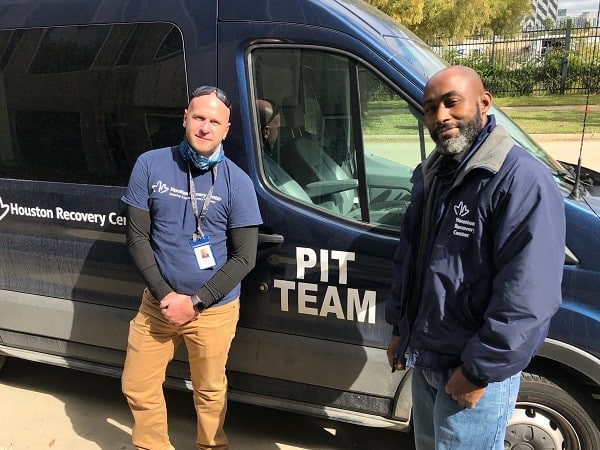Bringing the Sobering Center to the Streets

Nick Darrow and Brandon Wyatt | Public Intoxication Transport Team
Our Public Intoxication Transport (PIT) Team program brings the sobering center to the streets.
This proactive approach identifies intoxicated people within specific boundaries of downtown and midtown Houston and connects with them to determine if they are ready to get off the streets and into the sobering center. PIT includes calls from law enforcement and the community. A majority of their activity are wellness checks and building rapport with clients. The PIT team estimates 95%-98% of their clients are individuals who are homeless.
“The foundation is establishing a relationship with them and establishing trust,” says Nick Darrow, peer recovery support specialist with PIT. “We tell them, ‘If you see us, holler at us and we’ll give you a sandwich or something.’”
No surprise, PIT’s number of transports has decreased in 2020 due to the pandemic. Before COVID-19, PIT team averaged 250-300 calls a month. In recent months, that number has been cut in half. Many homeless have left the downtown area since businesses are not open at full capacity or people are working from home. Panhandling is not as viable without as many business people around. In addition to calls from law enforcement, PIT continues to proactively work in the area and conduct wellness checks on the homeless.
Juggling duties on PIT team
The PIT team’s daily responsibilities include providing connections to resources, safely transporting individuals to the sobering center, listening actively as a coach, and de-escalating situations to offer help.
Part of the process is engaging clients to make sure they are medically ready to come to the sobering center. If not, Houston Fire Department takes them to the hospital, or they get connected to another appropriate agency.
PIT also provides resources for individuals by collaborating with a variety of law enforcement and agencies including HPD, HCSO, HFD, Metro PD, Downtown District, Midtown District, and Seal Security. They also assist individuals who are homeless with information on health care, housing, food, and getting identification – all the basic needs that help them get on their feet.
“Our main goal is to get them to the sobering center,” says Brandon Wyatt, fleet coordinator and PIT Team. “The help they need is placed in front of them, and we help them understand they are going to a safe place.” Sometimes individuals mistake the PIT van for law enforcement.
For safety reasons, PIT does not go to homeless encampments. But as they drive by, individuals who are homeless come to them. Darrow says the individuals get excited, and the PIT team loves that. Their focus is talking with them, not at them. And our peer recovery support specialists often share their own story with lived experience.
“Experience is everything – and empathy is so important. We want them to know there is someone to talk to,” Darrow says. “We aren’t judging them but sitting right next to them.”